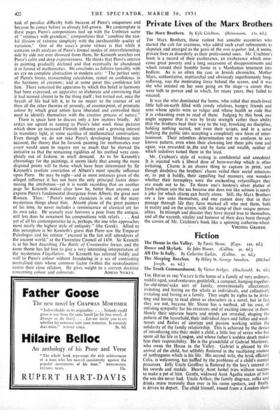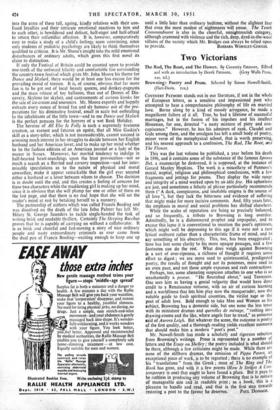Fiction
All Else Is Folly. By Catherine Gaskin. (Collins. 9s. 6d.) The Sleeping Bacchus. By Hilary St. George Saunders. (Michael Joseph. gs. 6d.) The Tenth Commandment. By Victor Bridges. (Macdonald. 8s. 6d.) THE HOUSE IN THE VALLEY is the home of a family of very ordinary. middle-aged, unadventurous gentlefolk, a compact, hanging-together- for-old-times'-sake sort of family, conventionally affectionate. irritating and boring on the whole as individuals, and collectively irritating and boring as a family. They ought by rights to be irrita- ting and boring to read about as characters in a novel, but in fact they are not, because Mr. Shone has a method, all his own, of enlisting sympathy for his creatures and of exciting interest in them. Slowly their separate hearts and minds are revealed, shaping the pattern of the household, their individual fears and follies and weak- nesses and flashes of courage and passion working within the solidarity of the family relationship. This is achieved by the device of introducing into their midst a child, a little boy of seven who has spent all his life in London, and whose father's sudden death makes him their responsibility. He is the grandchild of Gabriel Mortimer. who owns the House in the Valley. Gabriel is pleased by the arrival of the child, but selfishly flustered in the vacillating routine of nothipgness which is his life. His second wife, the brisk efficient Celia, is welcoming, but baffled by the problems of a child's mental processes. Jolly Uncle Geoffrey is flattered by the boy's interest in his swords and medals. Hearty,Aunt Isobel tries without success to make a pet of him. Gentle, widowed Aunt Agatha makes of him the son she never had. Uncle Arthur, the family disgrace, sulks and drinks more morosely than ever in his room upstairs, and finally is driven to depart. The child himself, tossed from a London slum
into the arms of these tall, ageing, kindly relatives with their con- fused loyalties and their intricate emotional reactions to him and to each other, is bewildered and defiant, half-eager and half-afraid to return their unfamiliar affection. It is, however, comparatively easy to make a study of a child's feelings seem convincing, since only students of pediatric psychology are likely to think themselves qualified to criticise. It is Mr. Shone's insight into the mild emotional disturbances of ordinary adults, which gives this first novel its claim to distinction.
If only the Festival of Britain could be counted upon to provide one-tenth of the unforced hilarity and comfortable fun surrounding the-country-town festival which gives Mr. John Moore his theme for Dance and Skylark. there would be at least one less excuse for the prevailing mood of tension. It is, of course, obvious that far more fun is to be got out of local beauty queens, and donkey-pageants and the mass release of toy balloons, than out of Domes of Dis- covery, Skylons (or skyloi), and cantonments of curious kiosks for the sale of ice-cream and souvenirs. Mr. Moore expertly and happily extracts every ounce of broad fun and sly humour out of the pre- parations for his diminutive festival, small in scale but enthralling to the inhabitants of the little town—and to me Dance and Skylark is the perfect panacea for the horrors of a wet Bank Holiday.
The heroine of All Else Is Folly is such a supremely tiresome creature, so earnest and fatuous an egoist, that all Miss Gaskin's skill as a story-teller, which is not inconsiderable, cannot succeed in arousing much interest in her struggles to decide between her English husband and her American lover, and to make up her mind whether to be the fashion editress of an American journal or a lady of the manor in Sussex. Moreover, her morbid tendency to indulge in half-hearted heart-searchings upon the least provocation—not so much a search as a flurried and cursory inspection—and her inter- minable speculations as to the nature of physical and moral cowardice, make it appear remarkable that the girl ever secured either a husband or a lover between whom to choose. The decision is in doubt until the end, and this creates a feeling of concern for these two characters while the maddening girl is making up her mind, since it is obvious that she will plump for one or other of them on the last page, and that there is no real hope that she will set the reader's mind at rest by betaking herself to a nunnery.
The partnership of authors which was called Francis Bccding and- was dissolved on the death of the late John Palmer has left Mr. Hilary St. George Saunders to tackle single-handed the task of writing brisk and readable thrillers. Certainly The Sleeping Bacchus proves that he is capable of carrying on without a collaborator. It is as brisk and cheerful and fast-moving a story of nice ordinary people and nasty extraordinary criminals as ever came from the dual pen of Francis Beeding—exciting enough to keep one up until a little later than ordinary bedtime, without the slightest fear that even the most modest of nightmares will ensue. The Tenth Commandment is also in the cheerful, unnightmarish category, although crammed with violence and the rich, deep, dyed-in-the-wool villains of the variety which Mr. Bridges can always be relied upon































 Previous page
Previous page